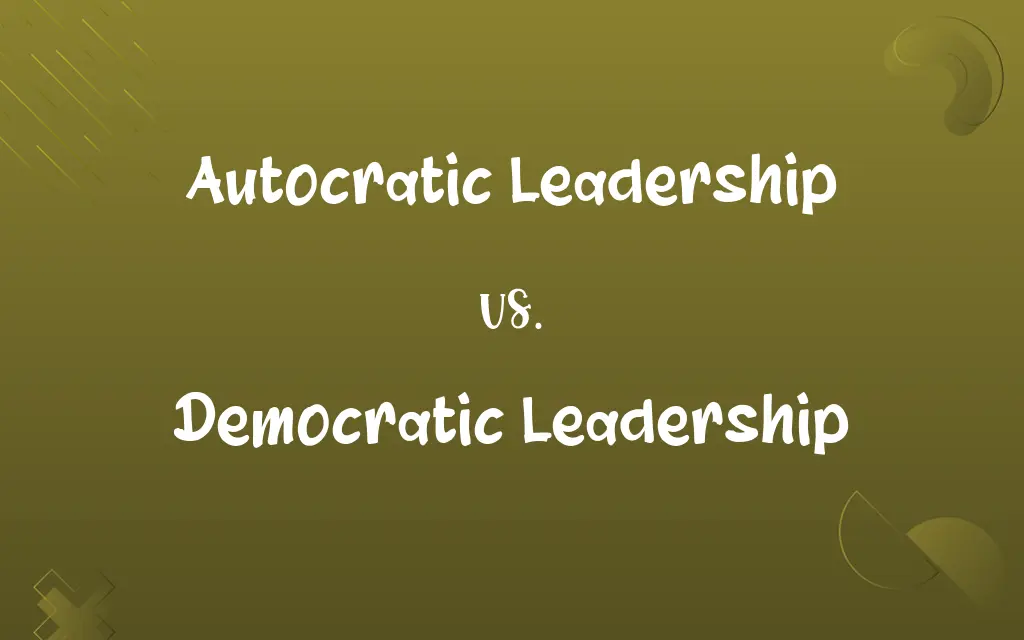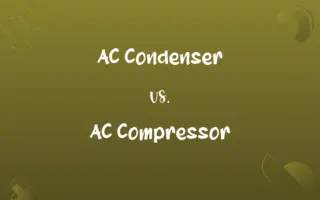Autocratic Leadership vs. Democratic Leadership: Know the Difference

By Dua Fatima & Shumaila Saeed || Published on March 1, 2024
Autocratic leadership involves unilateral decision-making and strict control, while democratic leadership focuses on group participation and consensus-building.

Key Differences
Autocratic leadership is characterized by individual control over all decisions and little input from group members. In contrast, democratic leadership, also known as participative leadership, encourages team members to contribute to the decision-making process. This style values the input of every member and decisions are often made by consensus.
Shumaila Saeed
Mar 01, 2024
Autocratic Leaders in this style make choices based on their judgments and ideas, often without consulting team members. This approach can lead to quick decision-making but may also result in a lack of creativity and lower team morale. While democratic leadership can increase creativity and satisfaction among team members, it may also lead to slower decision-making processes.
Dua Fatima
Mar 01, 2024
Autocratic leaders typically have clear visions and can be effective in situations where rapid, decisive action is needed, such as in crises. Democratic leaders, on the other hand, excel in environments where innovation and team engagement are crucial for success.
Shumaila Saeed
Mar 01, 2024
The impact of these leadership styles extends beyond decision-making. Autocratic leadership can lead to higher efficiency in tasks with clear guidelines, whereas democratic leadership can foster a more motivated and cohesive team, enhancing overall productivity and innovation.
Hifza Nasir
Mar 01, 2024
The choice between autocratic and democratic leadership often depends on the situation, goals, and team dynamics. While autocratic leadership can be seen as outdated in some contexts, it remains effective in specific scenarios. Conversely, democratic leadership is increasingly popular in collaborative environments but may not always be suitable for every situation.
Shumaila Saeed
Mar 01, 2024
ADVERTISEMENT
Comparison Chart
Decision-making
Centralized, leader makes all decisions.
Decentralized, team input shapes decisions.
Dua Fatima
Mar 01, 2024
Team Involvement
Minimal to none; leader dictates actions.
High; encourages participation and feedback.
Shumaila Saeed
Mar 01, 2024
Speed of Decisions
Fast, due to unilateral decisions.
Slower, due to need for consensus.
Shumaila Saeed
Mar 01, 2024
Environment Suited
Effective in crises or when tasks are routine.
Best for innovative and collaborative tasks.
Dua Fatima
Mar 01, 2024
Impact on Team
Can lead to efficiency but lower morale.
Increases satisfaction and creativity.
Shumaila Saeed
Mar 01, 2024
ADVERTISEMENT
Autocratic Leadership and Democratic Leadership Definitions
Autocratic Leadership
Known for quick decision-making without group consultation.
His autocratic decision to change suppliers saved the company during the supply crisis.
Shumaila Saeed
Feb 29, 2024
Democratic Leadership
Encourages open communication and shared responsibility.
His democratic approach fostered a culture of open dialogue and innovation.
Dua Fatima
Feb 29, 2024
Autocratic Leadership
Effective in urgent or highly regulated scenarios.
Her autocratic leadership ensured the restaurant maintained standards during the inspection.
Shumaila Saeed
Feb 29, 2024
Democratic Leadership
A leadership style that involves team members in decision-making.
Through democratic leadership, the team collectively decided on the new marketing strategy.
Shumaila Saeed
Feb 29, 2024
Autocratic Leadership
Leadership style where control is concentrated in the hands of one individual.
The CEO's autocratic approach streamlined the project's completion but left some employees feeling undervalued.
Dua Fatima
Feb 29, 2024
ADVERTISEMENT
Democratic Leadership
Suited to environments where creativity and collaboration are key.
The design firm thrives under democratic leadership, encouraging creative solutions.
Shumaila Saeed
Feb 29, 2024
Autocratic Leadership
Can result in clear direction but may suppress team input.
The autocratic rule in the workshop increased output but stifled innovative ideas.
Dua Fatima
Feb 29, 2024
Democratic Leadership
Balances the distribution of power among team members.
Democratic leadership in the NGO led to inclusive policy development.
Hifza Nasir
Feb 29, 2024
Autocratic Leadership
Often seen in hierarchical organizations.
The military's autocratic structure enables swift execution of orders.
Shumaila Saeed
Feb 29, 2024
Democratic Leadership
Can lead to higher morale but requires effective communication.
The project's success was attributed to the democratic leadership style, boosting team morale and engagement.
Dua Fatima
Feb 29, 2024
Repeatedly Asked Queries
When is autocratic leadership most effective?
It's most effective in situations requiring quick decisions, in crises, or when tasks are highly structured and require clear direction.
Dua Fatima
Mar 01, 2024
What is autocratic leadership?
Autocratic leadership is a style where the leader makes decisions unilaterally, often without input from team members, focusing on efficiency and control.
Shumaila Saeed
Mar 01, 2024
What are the benefits of democratic leadership?
Benefits include increased team satisfaction, higher creativity, and improved problem-solving through diverse input.
Shumaila Saeed
Mar 01, 2024
How does democratic leadership affect decision-making?
While it can slow down the decision-making process due to the need for consensus, it often leads to more thorough and creative solutions.
Dua Fatima
Mar 01, 2024
Is one leadership style better than the other?
Neither style is inherently better; the effectiveness of each depends on the context, including the team's composition, the task at hand, and the organizational culture.
Dua Fatima
Mar 01, 2024
How do cultural values impact leadership styles?
Cultural values can significantly influence the preferred leadership style, with some cultures valuing hierarchical structures and others prioritizing egalitarian approaches.
Dua Fatima
Mar 01, 2024
What are the drawbacks of autocratic leadership?
Drawbacks can include reduced team morale, stifled creativity, and potential resistance from team members feeling undervalued.
Dua Fatima
Mar 01, 2024
How can leaders transition from autocratic to democratic leadership?
Transitioning involves fostering open communication, actively seeking team input, and gradually sharing decision-making responsibilities.
Dua Fatima
Mar 01, 2024
Can a leader be both autocratic and democratic?
Yes, many leaders adopt a flexible approach, switching between styles based on the situation, goals, and team needs.
Dua Fatima
Mar 01, 2024
What skills are important for democratic leadership?
Important skills include effective communication, active listening, empathy, and the ability to facilitate and respect diverse opinions.
Shumaila Saeed
Mar 01, 2024
How does democratic leadership work?
Democratic leadership involves team members in the decision-making process, valuing their input and fostering a collaborative environment.
Shumaila Saeed
Mar 01, 2024
How do team members typically respond to autocratic leadership?
Responses can vary; some may appreciate the clear direction, while others may feel disengaged or demotivated by the lack of input.
Shumaila Saeed
Mar 01, 2024
What is the impact of leadership style on organizational culture?
Leadership style can shape the organizational culture, with autocratic leadership fostering a more structured environment and democratic leadership promoting an open and collaborative culture.
Hifza Nasir
Mar 01, 2024
What challenges do democratic leaders face?
Challenges include managing diverse opinions, ensuring efficient decision-making, and maintaining leadership authority while empowering the team.
Dua Fatima
Mar 01, 2024
Can autocratic leadership lead to innovation?
While autocratic leadership is generally not associated with high levels of innovation, it can provide the decisive action necessary to implement innovative solutions.
Dua Fatima
Mar 01, 2024
Share this page
Link for your blog / website
HTML
Link to share via messenger
About Author
Written by
Dua FatimaCo-written by
Shumaila SaeedShumaila Saeed, an expert content creator with 6 years of experience, specializes in distilling complex topics into easily digestible comparisons, shining a light on the nuances that both inform and educate readers with clarity and accuracy.







































































